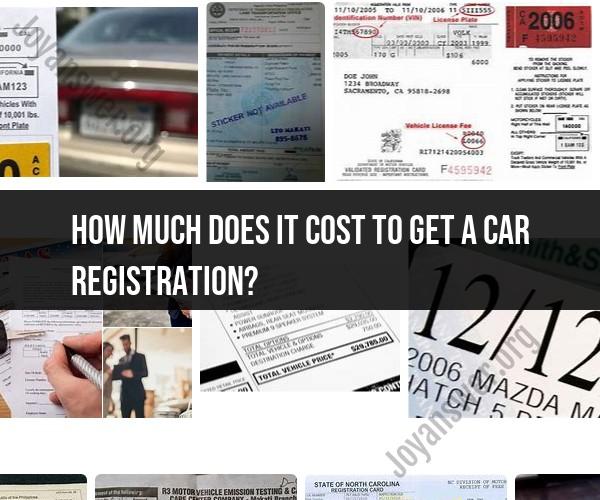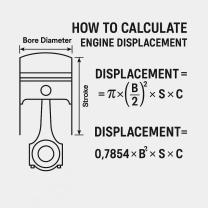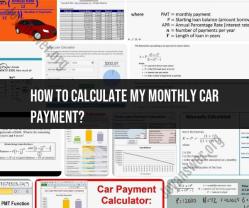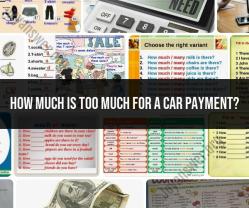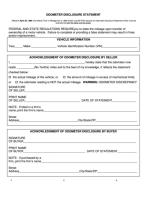How much does it cost to get a car registration?
The cost of getting a car registration can vary significantly depending on several factors, including the state or jurisdiction in which you live, the type of vehicle you own, and any additional fees or taxes that may apply. Here's a comprehensive guide on the factors that can influence the cost of car registration:
State or Jurisdiction: Registration fees are determined by individual states or jurisdictions, so the cost can vary widely. Different states have different fee structures, and they may use a variety of factors to calculate these fees.
Vehicle Type: The type of vehicle you own can influence the cost of registration. For example, passenger cars often have lower registration fees than commercial vehicles, trucks, or recreational vehicles.
Vehicle Age: Some states may charge different registration fees based on the age of the vehicle. Newer vehicles may have higher registration fees compared to older ones.
Vehicle Weight or Class: In some states, the weight or class of your vehicle can impact the registration fee. Heavier vehicles or specific vehicle classes may have higher registration costs.
Emissions or Smog Inspection: Some states require emissions or smog inspections for certain vehicles. If your state mandates such inspections, you may need to pay related fees to complete the registration.
Fuel Efficiency or Hybrid/Electric Vehicles: Some states offer incentives or discounts for fuel-efficient or eco-friendly vehicles, such as hybrids or electric cars. In such cases, you may receive a lower registration fee.
County or Local Fees: In addition to state registration fees, some counties or local jurisdictions may impose additional fees or taxes. Be sure to check with your local government for any specific fees that may apply.
Specialty or Personalized Plates: If you opt for specialty or personalized license plates, there may be an extra cost associated with them.
Renewal Period: Vehicle registration is typically renewed annually, but some states offer multi-year registration options at a discounted rate. The cost can vary based on the renewal period you choose.
Late Fees: If you fail to renew your registration before the expiration date, many states will charge late fees.
Additional Services or Options: Some states may offer additional services, such as expedited processing or delivery of your registration documents, which may come with extra fees.
It's essential to check with your state's Department of Motor Vehicles (DMV) or equivalent agency to determine the specific registration fees and requirements in your area. They can provide detailed information about the cost of registration, required documents, and any potential discounts or exemptions that may apply based on your individual circumstances. Keep in mind that the information provided here is general, and the specific details can vary widely from one location to another.
Car Registration Costs: What to Expect and How to Budget
Car registration costs vary from state to state, but there are some general components that are typically included in the total cost. These include:
- Registration fee: This is a base fee that is charged by the state to register your vehicle.
- License plate fee: This fee covers the cost of manufacturing and issuing your license plates.
- Vehicle property tax: This tax is based on the value of your vehicle and is typically assessed by the county in which you live.
- Other fees: Some states may also charge additional fees, such as a smog inspection fee or a highway use tax.
The total cost of car registration can range from a few hundred dollars to over a thousand dollars, depending on the state where you live and the type of vehicle you own.
To budget for car registration costs, you can start by looking up the fees that are charged in your state. You can also try to estimate the value of your vehicle so that you can get an idea of how much property tax you will pay. Once you have a good understanding of the costs involved, you can create a budget that includes a line item for car registration.
Understanding the Components of Vehicle Registration Fees
The components of vehicle registration fees vary from state to state, but some of the most common fees include:
- Registration fee: This fee covers the administrative costs of processing and maintaining vehicle registration records.
- License plate fee: This fee covers the cost of manufacturing and issuing license plates.
- Vehicle property tax: This tax is based on the value of your vehicle and is typically assessed by the county in which you live.
- Smog inspection fee: This fee is charged in some states to cover the cost of smog inspections.
- Highway use tax: This fee is charged in some states to help fund road and bridge construction and maintenance.
Calculating the Total Cost of Car Registration
To calculate the total cost of car registration, you will need to add up the costs of all of the applicable fees. You can usually find a list of the fees that are charged in your state on the website of your state's Department of Motor Vehicles (DMV).
Once you have added up the costs of all of the applicable fees, you will have the total cost of car registration.
Registration Renewal and Compliance for Vehicle Owners
Vehicle owners are required to renew their vehicle registration on a regular basis. The renewal period varies from state to state, but it is typically one or two years.
To renew your vehicle registration, you will need to pay the applicable fees and provide proof of insurance. You may also need to have your vehicle inspected in some states.
It is important to comply with all vehicle registration requirements. If you do not renew your registration on time or if you do not have the required insurance, you may be subject to fines and penalties.
Personal Experiences and Tips on Managing Car Registration Expenses
Here are a few personal experiences and tips on managing car registration expenses:
- Budget for car registration costs. Car registration costs can be a significant expense, so it is important to budget for them. You can start by looking up the fees that are charged in your state. You can also try to estimate the value of your vehicle so that you can get an idea of how much property tax you will pay. Once you have a good understanding of the costs involved, you can create a budget that includes a line item for car registration.
- Shop around for insurance. The cost of car insurance can vary significantly from company to company. It is important to shop around for insurance to get the best deal.
- Consider a used car. Used cars are typically less expensive to register than new cars. If you are on a budget, you may want to consider buying a used car.
- Keep your car in good condition. A well-maintained car is less likely to need expensive repairs. This can save you money on car registration costs in the long run.
By following these tips, you can manage your car registration expenses and keep your car on the road.
